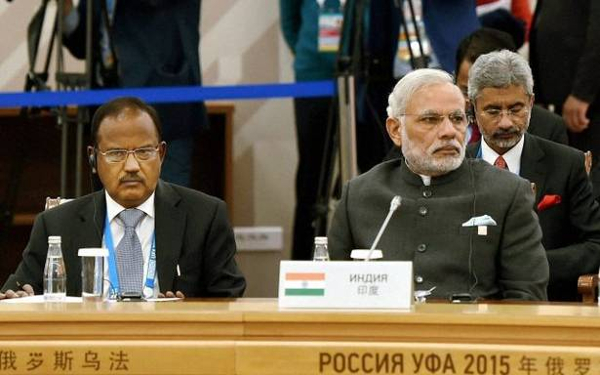Prime Minister Narendra Modi’s spymasters in his second term are expected to be a mix of the old and the new guard, with Ajit Doval likely to remain at the helm of the National Security Council Secretariat (NSCS).
While there was buzz of likely elevation of Deputy NSA R.N. Ravi, or co-opting of S. Jaishankar for a significant role in the NSCS for his acumen on foreign policy, the BJP government’s surge has also silenced critics of Doval within the security establishment. The Balakot strikes and successful extradition of fugitives like Christian Michel are some of the major operations which steered the BJP’s election victory.
Sardar Patel Bhawan on Parliament Street is expected to become the next big stop after the PMO in the next five years, as the national security policy will be driven from there. Sources in the security establishment said that the new and revamped NSCS has attempted to draft a national security document under Doval’s guidance which may be brought before the public in the coming months.
New chiefs will be appointed to the two central intelligence agencies—Research and Analysis Wing (RAW) and the Intelligence Bureau (IB)—as tenures of both Anil Dhasmana and Rajeev Jain come to an end next month. Both had completed their two year fixed tenures in office on December 31 and were due to retire, but were given six month extensions. The six month extension comes to an end in June. The Appointment Committee of Cabinet chaired by PM Modi will select the new chiefs by the end of June. While the process of selection will begin after the new government takes charge, the names doing the rounds for RAW chief are K. Ilango, former station chief in Colombo, who was accused by Mahinda Rajapaksa of having managed the 2015 presidential polls in favour of Maithripala Sirisena, Samant Goel, and Subodh Jaiswal. In the IB, the front-runner is Arvind Kumar, currently posted as special director.
The revamped NSCS, meanwhile, has just begun its work, sources said, and the focus will be on a more coordinated, holistic and cohesive response to challenges facing the country in various sectors like defence, internal security, finance, atomic energy and space. A step in the right direction was giving the NSA the charge of the Strategic Policy Group (SPG), besides making the cabinet secretary and vice chairman of NITI Aayog members of the group in a bid to align the security and development initiatives of the government, a senior security official said. The SPG was set up in 1999 by the Vajpayee government after the onset of the Kargil conflict. The appointment of former defence intelligence agency chief Lt Gen V.G. Khandare as the military adviser, and the NSA chairing the newly set up Defence Planning Committee, are seen as further attempts to address the gaps in defence management.
There are many challenges in front of the new security brass. The promise of the resolution of the decades-old Naga insurgency through a peace accord; the extradition of economic offenders like Vijay Mallya and Nirav Modi; the Pakistan policy and unrest in Kashmir, apart from the radicalisation threat driven by IS in the neighbourhood.
Source: TW
Image Courtesy: THBL
You may also like
-
IAF Aircraft Set Course For Exercise Eastern Bridge VII At Oman
-
IAF Set To Host The Indian Defence Aviation Exposition-II At Jodhpur
-
Defence Secretary to co-chair 5th India-Philippines Joint Defence Cooperation Committee meeting in Manila
-
Simultaneous Launch Of ‘malpe And Mulki’, Fourth And Fifth Ships Of Asw Swc (Csl) Project
-
Aatmanirbharta in Defence: MoD signs Contract with HAL for 240 AL-31FP Aero Engines for Su-30MKI Aircraft
